
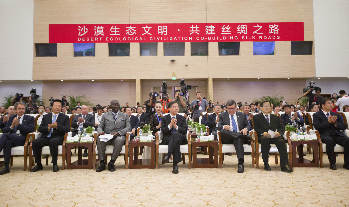
HELD on July 28 and 29, 2015, the Fifth Kubuqi International Desert Forum was attended by 300 participants from 40-odd countries and regions. They included high-ranking officials from governments and international organizations, entrepreneurs, scientists, scholars, and reporters. At the heart of the Kubuqi Desert in China’s Inner Mongolia the participants saw for themselves how the desert town has curbed desertification and improved its environment by commercial means, how it has helped better people’s lives, and how local businesses have boomed as a result.
Vice Premier Wang Yang attended the opening ceremony and made a key-note address. UN Secretary-General Ban Ki-moon sent a congratulatory message; and Vice Chairman of the Chinese People’s Political Consultative Conference and Minister of Science and Technology Wan Gang, Administrator of the State Forestry Administration Zhang Jianlong, Secretary of the Party Committee of Inner Mongolia Autonomous Region Wang Jun, and the Executive Secretary of the United Nations Convention to Combat Desertification (UNCCD) Monique Barbut attended the forum and gave speeches. Among the speakers were José Manuel Barroso, former president of the European Commission and former prime minister of Portugal, John Agyekum Kufuor, former chairman of the African Union and former president of Ghana, and Jose Luis Rodriguez Zapatero, former prime minister of Spain.
All agreed that desertification is a serious barrier to sustainable development, and that the prevention and control of desertification is an arduous task. The participants called on the international community to strengthen cooperation and promote green development in an effort to reach land degradation neutrality by 2030, a goal set by the UN.
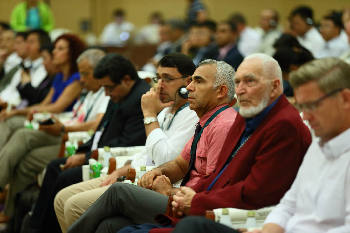
The Fifth Kubuqi International Desert Forum is held from July 28 to 29.
New Development in Combating Desertification
The Kubuqi International Desert Forum is the world’s only forum committed to promoting the prevention and control of desertification and ecological and economic development at the global level. Founded in 2007, the biennial forum has been held on five occasions.
During the meeting, former UN Deputy Secretary-General Sha Zukang spoke highly of the forum, praising it as “rich in content and forward-looking.” He also commented on the necessity of building more platforms like the Kubuqi Forum, so that different countries might share their experience and technology on fighting desertification, continue to promote green development, and increase assistance to ecologically-fragile countries.
The first forum to be run in the PPP (public-private partnership) mode, Kubuqi was jointly hosted by China’s Ministry of Science and Technology, the Government of the Inner Mongolia Autonomous Region, the United Nations Environment Program (UNEP), and the UNCCD Secretariat, and organized by the municipal government of Ordos and Elion Foundation. With joint efforts from the government, the private sector, and the public, the forum builds partnerships among the participants and ensures its own sustainability.
Based on the UN’s post-2015 development agenda and the Chinese government’s proposal of making ecological progress and jointly building the Belt and Road, the forum featured in-depth discussions on technological advancement and institutional innovation, marketing, financing and commercial mechanisms, the development of desert ecological economy, and the realization of the harmonious development of man, economy, society, and the environment. It aims to explore new paths for combating global desertification, implementing sustainable development plans, and promoting the coordinated development of the Silk Road Economic Belt.
The Consensus of the Fifth Kubuqi International Desert Forum is an important outcome. It stresses that desertification is a grave global ecological issue that directly affects two thirds of the world’s countries and one fifth of its population, and poses real threats to the survival, health, safety, and peace of humankind. It is a key variable to sustainable development.
The forum passed the Post-2015 Vision on Ecological Progress and Cooperation Framework and the Kubuqi Action Plan of Global Desertification Control (2015-2025). Agreement was also reached on the establishment of a global desert ecological economy alliance, a non-profit NGO. Running in the PPP mode, the alliance will draw on the global commercial, technological, and cultural advantages and mobilize more resources to promote ecological progress, jointly build the Belt and Road, realize land degradation neutrality by 2030, implement the post-2015 action plan, and address climate change.
According to the forum’s general secretary and chairman of Elion Resources Group Wang Wenbiao, incorporating China’s proposal on ecological progress in the post-2015 action plan is a great innovation.
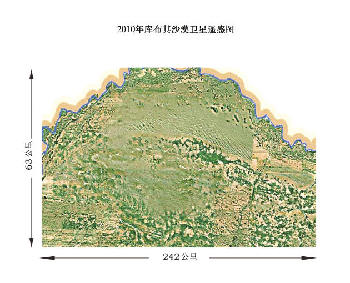
A comparison of satellite photos respectively taken in 2000 (left) and in 2010.
Elion Experience Draws Attention
As the permanent site of the Kubuqi International Desert Forum, Kubuqi exhibited its achievements in combating desertification during the forum, and shared its experience with the world.
Elion Resources Group, based in the Kubuqi Desert, saw business opportunities in the restoration of the ecology, and turned ecological conservation into an industry. Through innovation in technology, corporate system and methodology, Elion has struck the balance between commercial development and ecological protection. Utilizing resources from the desert, Elion pioneered a mode of desertification control that involves four stages: desertification prevention and control, ecological restoration, industrial development, and soil amelioration. Following this mode Elion has not only curbed expansion of the desert, but also explored a desertification control model stressing both ecology and economy and fighting both sand and poverty. As the incomes of local farmers and herdsmen are increasing and the company makes healthy profits, Elion has created the Kubuqi Model, which drew wide attention from the forum participants.
During the forum Elion Resources Group won the 2015 Land for Life Award, through which the UNCCD re-cognizes those who have brought about significant changes to sustainable development and land restoration-related activities. According to Wang Wenbiao, the Kubuqi Model has two core values: innovation and industrialization.
Former President of Ghana John Agyekum Kufuor described the Kubuqi achievements as a “miracle,” saying that Kubuqi had adopted more innovative methods to address desertification, which not only saved the ecology but also lifted thousands out of poverty. He said: “Kubuqi’s story is inspiring. The desert has been turned into an ecological oasis, and industries are booming. Kubuqi’s achievements were made possible through scientific and technical progress, and very strict planning. It has integrated science, technology, and the private sector with mature and advanced outlooks on development.” Mr. Kufuor also encouraged African countries to learn from Kubuqi’s experience.
UNCCD Executive Secretary Monique Barbut said that Elion’s mode of combating desertification, with 27 years of successful practice, can be emulated by other developing countries and countries poor in resources.
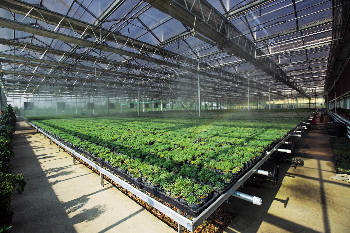
Elion has done all it can to collect and preserve genetic resources of desert shrubs and endangered plants.
Innovate Online
On July 28 Elion Resources Group signed cooperation agreements with Huawei Technologies, Co., Ltd, a global leader in information and communications solutions, and Charoen Pokphand Group, a well-known multinational, whose core business is agriculture, in an effort to build an Internet+new agriculture mode.
Boasting inexhaustible solar energy from the desert and organic food resources, a rarity in the age of the Internet, Elion, in cooperation with Huawei, will develop an integrated photovoltaic industry featuring desertification control, power generation, crop farming, animal husbandry and poverty alleviation. With its strength in digital information, telecommunications, and Internet technology, Huawei will help build fully digitalized photovoltaic power stations, which will run automatically with unmanned patrol drones, smart mobile terminals, surveillance cameras, and 24-hour online monitors.
In the next three to five years, Elion and Charoen Pokphand Group plan to restore 200,000 hectares of desert land in Kubuqi, Tengger, and Taklamakan for developing modern ecological husbandry. The investment will be made in forage grass planting, drought crop planting, feed processing, and cattle and sheep rearing, forming an industrial chain of agriculture and animal husbandry to serve the markets of Beijing, Tianjin, and Hebei.
By collecting ideas and inspirations from around the world, the Kubuqi International Desert Forum discusses the regulation and control of deserts through the global desert technology network. The cooperation between Elion, Huawei, and Charoen Pokphand aims to develop the Kubuqi Model online, which will hopefully shed more light on global desertification control.
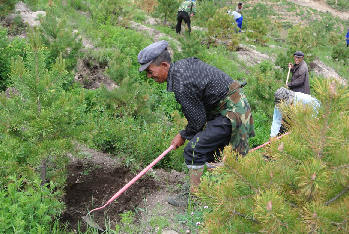
Farmers plant trees in Zhangjiakou, the co-host city of the 2022 Winter Olympics.
